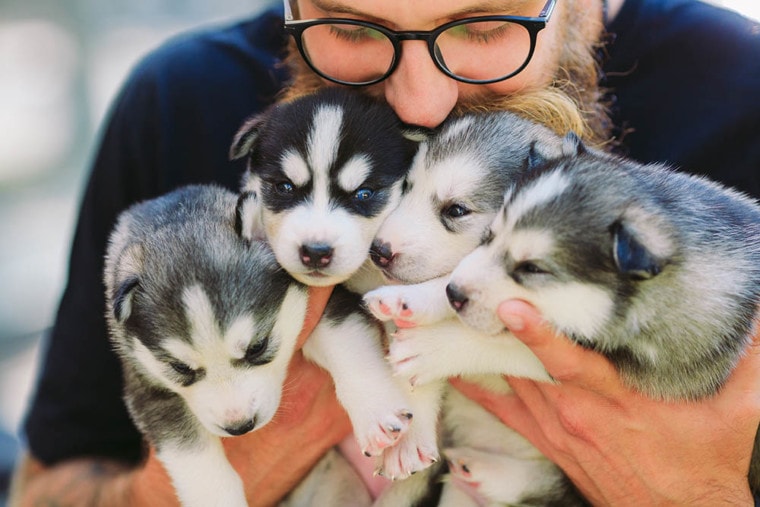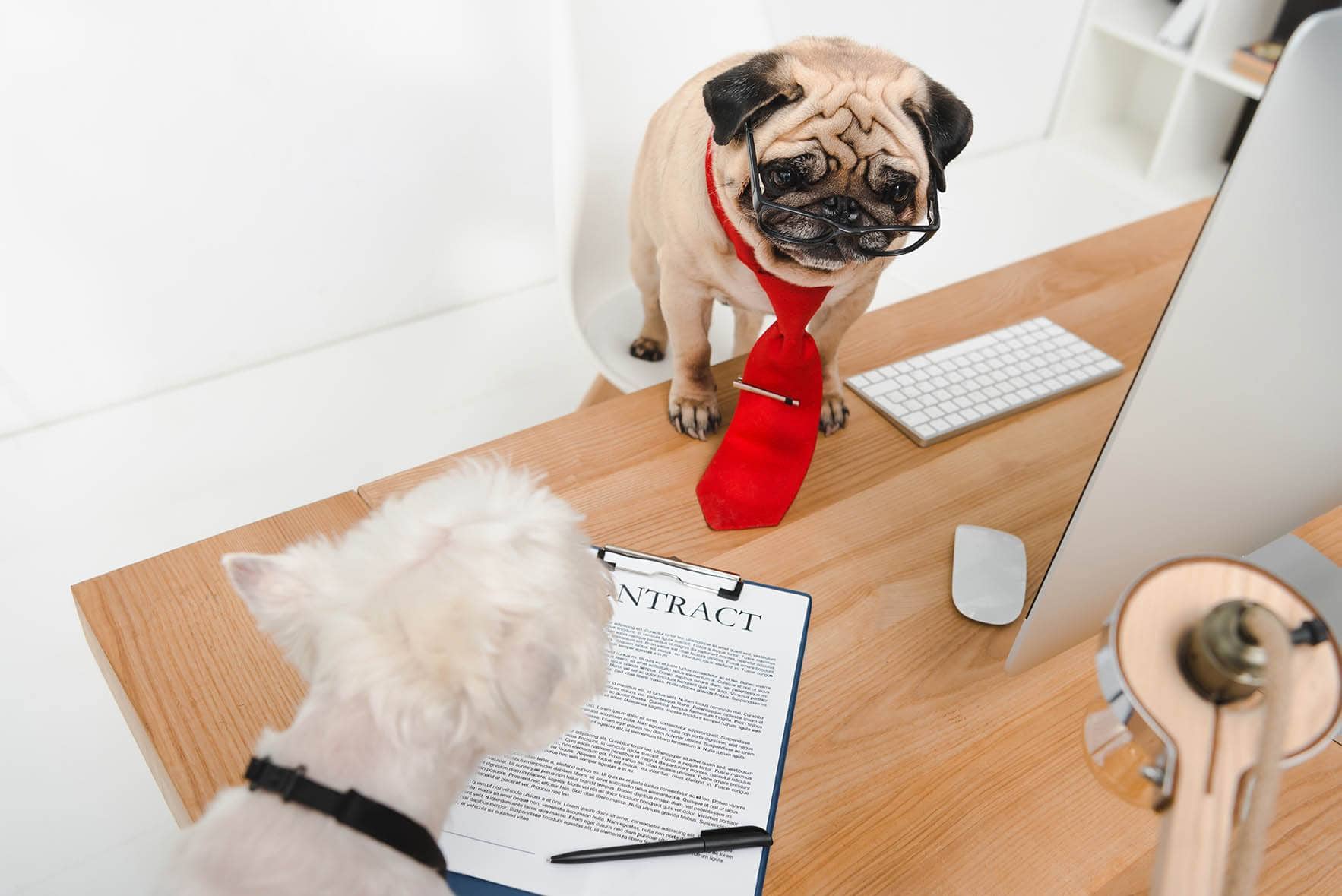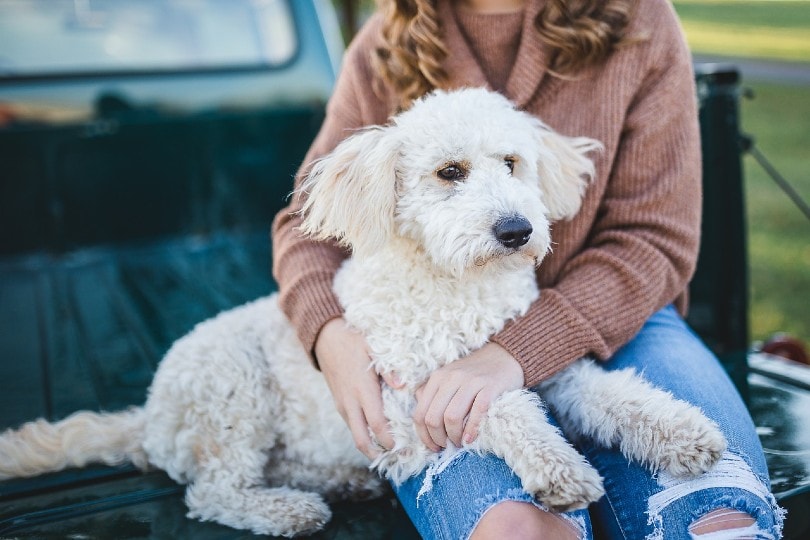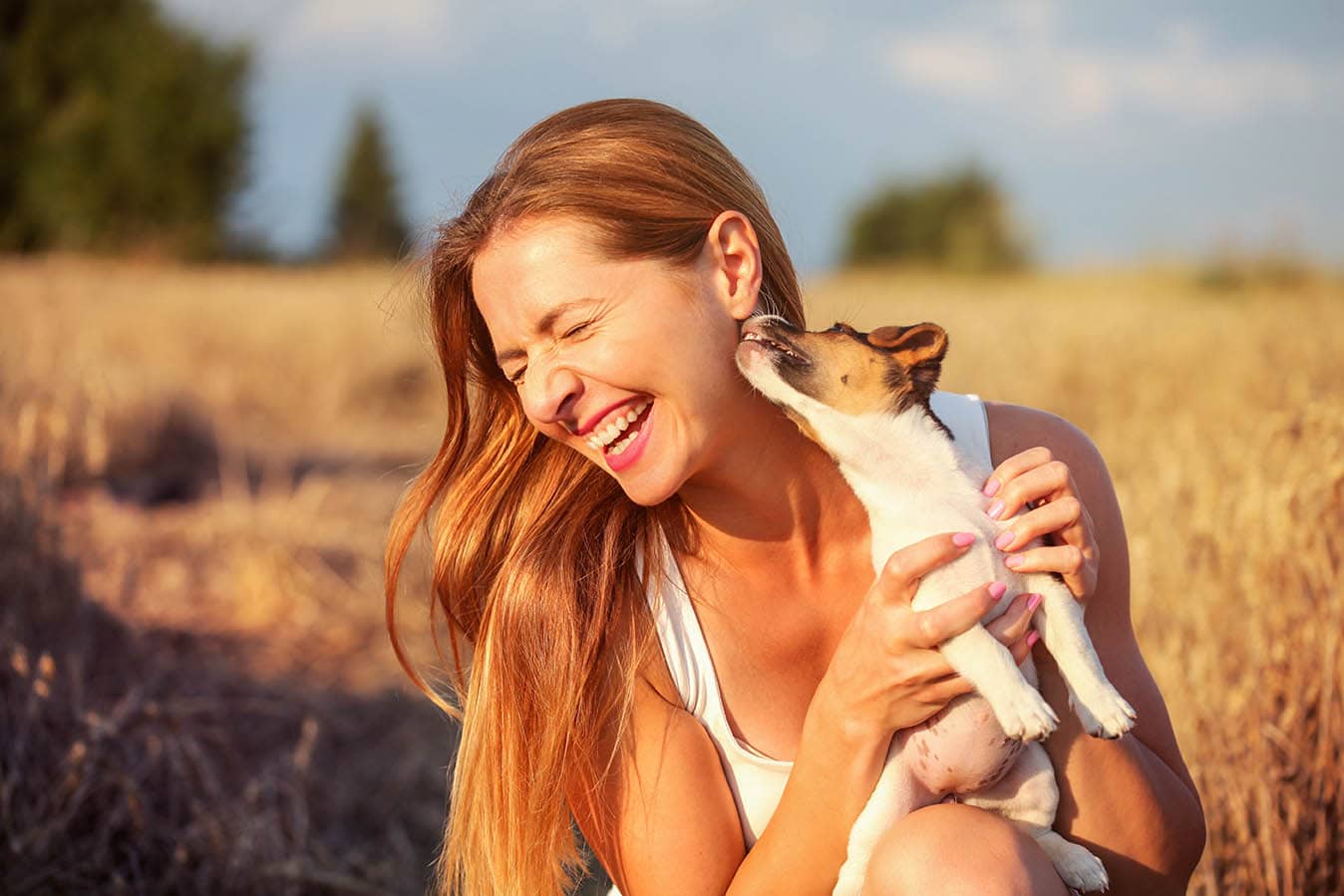
When you are selecting a breeder for your new canine companion, you need to be as thorough in your research as possible. Proper breeding practices lay the foundation for the temperament and health of your puppy, and you definitely want to ensure that you’re making a sound investment.
It’s best to steer clear of puppy mills and backyard breeding situations. You should also understand upfront costs, house visits, and any applicable contracts that come with bringing home your new puppy. Read on for the various questions that you should ask dog breeders and the signs of poor breeding practices.
Why It’s Important to Get a Quality Puppy
It might be tempting to cut corners when you buy a puppy, and people who advertise purebreds at a low cost may catch your eye. Purebred dogs can be pretty expensive, so you might think that you’re getting a deal—but that couldn’t be any further from the truth.
Low costs and shoddy home setups may be a sign of poor breeding. If something feels off about someone selling a litter of puppies, listen to your intuition and pay attention to cues.
Puppies from lousy home situations often have issues with health and temperament and might have issues thriving. Not only is this bad for the puppies, but paying these kinds of breeders also encourages the practices to continue.
So, buying a puppy might be expensive, but it’s worth it for quality. Breeders who have chosen a certain breed have done so because of their love of the breed and nothing more. They will do anything to uphold the care and quality of their litters, dames, and sires.

The 18 Questions to Ask a Dog Breeder
So, a litter of puppies has caught your eye, it’s time to ask the hard questions. Don’t be afraid of overdoing it. Remember that you are committing to a dog for their whole life, and it’s critical to know what to expect.
Ask the breeder as many questions as you can before you decide that one of their puppies will come home to your family.
1. What Are the Parents’ Temperaments Like?
It might not seem like a question that comes to mind right away, but it’s often the most important. Genetically, parents pass down their personality traits to each puppy. Some might get more of Mom, others might get more of Dad, and some pups are anomalies all their own.
But if your pup’s parents are prone to aggression, submissiveness, friendliness, or any other characteristics, it’s good to know what to expect. An introduction to the parents is the first glimpse into what your puppy will be like when all grown up.
Certain traits might stick out to you over others too. For instance, if you want a protective guard dog, having a parent that is proven to take on this role is essential. Or rather, if you want a lazy lap dog companion, a parent carrying these traits makes it more likely your pup will.
Granted, not every personality quirk will pass over. But it is good to get an idea of sound temperament to know your dog will be a mannerly and well-rounded adult. It’s also completely normal to request a meeting with the parents, so don’t shy away from making this request.

2. Is a Puppy Deposit Required?
Breeders ask for puppy deposits for a few reasons. The number-one reason is likely to make sure the buyer is secured. Many times when you are a seller, people can give you the run-around, asking a million questions and stringing you along only to ghost you in the end.
Most breeders want to know that their pup’s potential forever home is totally serious about their new family addition. If you put a deposit down on your chosen puppy, this shows your sense of responsibility and commitment to this animal.
Another reason people ask for puppy deposits is to secure a home before their puppy is of age to leave their mother. It can be a little challenging to find a buyer if they wait to advertise until they are ready to leave the nest. Many breeders like to show pictures of the pups, perform home visits, and get to know potential owners before handing over the pups.
Lastly, people may ask for puppy deposits as a way to cover vet and breeding costs. It can be expensive to raise a litter of puppies. Most responsible breeders have vet checks, first rounds of vaccines, and a round of dewormer and flea treatment before sending off their puppies. Also, they need to switch the puppies from their mother’s milk to dry kibble before they’re sent off to their homes. There can be many costs involved, and many breeders like to have that extra cushion to help out along the way.
If the breeder you pick requires a deposit, you must know to factor the cost into your budget.
3. Do You Have Puppy Contracts?
If you are unfamiliar with the term, puppy contracts are put in place to protect purebred dogs from winding up in shelters. A puppy contract is a small document listing the terms of placement. Many breeders will make you sign this document to state that if you are unable to care for the animal, you will safely return them to the breeder.
Since so many dogs wind up being passed around from home to home, this is a great way for breeders to implement safe transitions to forever homes with serious owners.

4. Is There a Health Guarantee?
Health guarantees state that the puppy is leaving to go to their home in top-notch health. A licensed veterinarian has looked over the pup to ensure that they are fit and disease and defect free and have had their first round of vaccinations.
A quality breeder will provide a health guarantee that their puppies have received proper vet care and have a clean bill of health.
5. Does My Puppy Come With Prior Vetting?
Knowing exactly what vet care your puppy has received is absolutely critical information. After all, you wouldn’t want to double up on shots, overloading your dog’s sensitive system. Also, who wants to pay extra for something the puppy doesn’t even need?
6. Are Your Breeding Dogs Kept as Pets?
Some breeders prefer to use dames and sires as strictly breeding and show dogs, and others keep them as family pets. It might not matter to you how your breeder chooses to keep the dogs, but some families prefer the puppy receive hands-on, loving care before committing.
We must state that just because some breeders take a less-personal approach to attachment styles, it doesn’t mean the puppies are of lower quality. It simply means you might have to spend a little extra time acclimating them into your home.

7. Do You Perform Home Visits?
It may seem invasive when you think of a home visit, but it’s actually a good indicator that the breeder genuinely cares for their puppies. It’s easy to breed and pass off pups for profit, but it’s a terrific sign when someone actually shows compassion for each offspring.
If your breeder requests a home visit, they may have a list of criteria they look for with future homes. For instance, if it’s a particularly high-energy breed, they might require a fenced-in yard. If it is a large breed, they may suggest no children under a certain age.
Also, if you claim that you live in an owned home, but you actually live in a rental that requires landlord approval, this might lead to rehoming eventually. Breeders don’t want that. They want their pups in homes that can accommodate their needs without issues.
Home visits give the breeder peace of mind knowing that they are placing their pups into homes where they will receive love forever.
8. Do You Allow Viewing Before Picking a Puppy?
Sometimes, breeders want you to commit to a pup before ever meeting them. Lots of potential owners feel uncomfortable with this, as it’s important to connect with your animal before purchase. Compatibility is a frequently overlooked component in pet purchases, which can lead to rehoming down the road.
Before you pick your puppy, ask your breeder if they allow you to meet the puppies before you decide which one you want. Sometimes, there is just a feeling when you meet them that goes beyond appearance. Even though it isn’t an issue for some people, if it’s important to you, always check.

9. Can You Tell Me About the Parents’ Health?
The health of each parent is absolutely vital information for buyers. If there are any genetic issues in the bloodline, this might involve an extra expense down the line. Plus, if there are any life-threatening illnesses, it could decrease the time you have with your puppy.
Some people aren’t comfortable committing to a puppy with a questionable health history. However, if you have a reputable breeder you’re working with, parents should be free from genetic issues.
10. Are the Puppies Registered With a Kennel Club?
If you buy a puppy from a reputable breeder, each parent should have a registration for a kennel club. Some will come with papers, and others will come without to a pet-only household.
You can ask if your puppy comes with or without papers. If you want breeding rights, this can involve a higher cost or additional terms or conditions. Some breeders who only give pups to pet-only homes will spay or neuter them before sending them off.
Others might require you to sign a contract, promising to take them to the vet for this surgery within a specific timeline. Each breeder should be clear and up front about their terms from the very beginning. But if they don’t specify, definitely ask so you can factor your tasks into the timeline.
11. Can I See the Living Conditions?
Seeing where the puppies live is a very key indicator of the overall care for the litter. If the puppies look like they are wallowing in their own filth, stay clear, even if the breeder has an otherwise good online reputation.
If the puppies appear clean and so does their living area, it indicates that they are cared for, regardless of whether they are outside or indoors. Some breeders don’t have the space within their homes to raise a litter of puppies.
But if they do have an outdoor area, there should be a clean, dry space for shelter. If you see a small whelping box and the puppies look dirty, cold, or thin, it might not be such a good situation for the litter.
12. Are the Puppies Fully Weaned?
Even breeders who have been around the block a time or two might try to cut corners. Some will try to place puppies before they are old enough to leave their mothers. No puppy should ever go to a new home before they are 8 weeks of age.
When puppies reach 8 weeks, they are fully weaned. That means they no longer rely on their mother as a food source and eat puppy chow strictly. Not only is full weaning necessary nutritionally speaking, but puppies also need this time to bond with their mother and siblings. These stages provide necessary social skills that are the foundational blocks for the rest of their lives.
Puppies should never go to new homes before 8 weeks, legally speaking. However, some breeders want to keep the puppies even longer (up to 14 weeks) for socialization purposes.

13. What Type of Puppy Chow Are They Eating?
Puppies can have very sensitive tummies. If you bring home a new pup to a totally different environment and change their food while you’re at it, it could wreak havoc on their digestive system. The last thing you want to do is clean up puddles of diarrhea during their first few weeks after homecoming.
Always ask the breeder what kind of puppy chow they’re eating. That way you can slowly transition the puppy to the food of your choice or just keep them on the recipe they are used to. Most of the time, puppies will come with a little baggy of food so you can transition them as you prefer.
You can also ask your breeder why they selected that specific recipe. Even if you were thinking about switching, their current diet might be the best option. To be safe, you can always check with your vet if you are unsure about the diet you want to select.
14. Can You Tell Me More About the Breed?
If you aren’t familiar with the breed you’re interested in, there is no one more knowledgeable to ask than the breeder themselves. After all, they have dedicated themselves to the breed entirely, producing future generations that uphold the authenticity of the breed.
If you take a genuine interest in the breed, the breeder will probably talk your ear off, answering any questions you might have. They will gladly tell you about each of the puppy’s personalities.
Each dog breed has a set of common characteristics that make them stand out among the rest. Just like the people you choose to associate with, dogs will mesh well with certain lifestyles over others.

15. Do You Think My Family Is Compatible With This Breed?
Your lifestyle is a very strong indicator of your compatibility with the breed. Many people wonder if a dog will be compatible in their home, but they rarely stop to ask if you are compatible with them.
Many cases of rehoming pets come from the lack of compatibility with the breed. Some people will buy a high-energy breed, like a German Shepherd or Brittany Spaniel, for instance, not realizing how much activity they need daily. The pent-up energy can cause destructive tendencies or nervous behaviors that are counterproductive.
Rather than understanding the physical, mental, and material needs that some dogs require, many owners become frustrated or let down by their dog’s limitations. It is no one’s fault, but rather an issue of lifestyle differences.
Whether you’re looking for a dog that is good in apartments, with children, with other adults, with cats and other animals, or whatever the criteria might be, it’s best to ensure that you’re getting the right dog for you.
16. How Many Dogs Do You Own?
Some breeders can get in over their heads. If they try to take care of too many dogs at once, they might scrimp on puppy care. You don’t want the breeder to get messy, overlooking the necessary care that the puppies need while growing.
Ask the breeder how many dogs they have. If the dog/caregiver ratio seems too much for you, you might want to look for another breeder who has had more time to socialize their pups.

17. How Long Have You Bred These Dogs?
Knowing the amount of time your breeder has spent with these animals tells a lot about the offspring. A person with genuine love and interest in the breed will likely stay with it for years and continue to produce stunning specimens.
That doesn’t mean a new breeder doesn’t share the same love; it just means they might not have the same groove. You can usually tell on energy and first impressions alone how much someone cares or how serious they are about breeding.
18. Can We Remain in Contact After the Placement?
Some breeders love to see updates of their puppies after they arrive at their new homes. In fact, many will welcome any photos of these growing pups with open arms.
Ask your breeder if you can contact them with updates, questions, or requested advice. Also, if you know the breeder is terrific at what they do, don’t hesitate to recommend them to others who might be looking for the breed you have.
The 10 Signs of Poor Breeding & Scams
Too many people use breeding for profit with no regard for the well-being of the animals involved. Other people might not even have a litter of puppies, but they want to use your emotions to scam you out of hard-earned cash.
As unfortunate and manipulative as it sounds, it happens all the time. Here are some red flags to look for when you interact with breeders.
1. The Breeder Is Reluctant to Show You Pictures
If a breeder is keeping the puppies in lousy living conditions, they aren’t going to want to disclose that to a buyer. They might take blurry pictures or otherwise poor-quality photos of puppies. If it seems like they are intentionally not showing you a clear view, consider this a sign to look elsewhere.
2. The Breeder Refuses a Visit to See the Puppies
A breeder might vehemently insist on meeting you rather than you picking up the puppies. This might be something simple, like a concern with the transmission of an illness. But if it seems like they don’t have a good reason or do not comply in other ways, keep this in mind.
3. The Breeder Is Pushy With You About the Purchase
If the breeder is trying to get you to commit to the purchase without answering your questions or being present during the conversation, you might want to veer away.

4. The Breeder Requests Money Up Front
Never give your money to a breeder without seeing the puppy first. This is a classic move of scammers, often trying to get you to send them money through means of a virtual account.
5. The Breeder Tries to Scam You Into Paying Ridiculously Low Prices for Promised Shipping
Shipping animals is not something we recommend. There are too many factors that come into play, even when people are transporting these pets with care. Your money and the puppy’s safety are at risk.
But some scammers charge suspiciously low prices for pets with a shipping promise—this is a huge red flag. Protect your finances.
6. The Breeder Has No Legitimate Website or Track Record
If you go to the website of the breeder and it looks suspicious, take note of this. Do they keep up with postings? Do they have trackable information listed? Does something seem off? If there is no legitimate information online, chances are that this is a poor breeder and you should stay away.
7. The Breeder Shows Puppies in Less-Than-Favorable Living Conditions
If you see a litter of puppies that look like they are living in mud and filth, stay away. Even if you feel terrible for these poor animals, buying from these sorts of breeders will only encourage and continue this breeding practice.

8. The Breeder Advertises on Unreliable Sites
You might see scammers or poor breeders posting ads on minorly regulated sites like Craigslist. They usually have lots of grammatical errors in the ads with minimal information. When you contact them, they might be pushy about sales or expect immediate financial commitments.
9. The Breeder Refuses to Show Documentation
If you are trying to get a purebred dog, breeders might claim they have a litter that you are seeking. However, if they don’t have any documentation proving the authenticity of the breed, steer clear.
10. The Breeder Has No Vet Information of Parents or Puppies
Proper vet care during the breeding, pregnancy, and postpartum stages is absolutely crucial to the well-being of these animals. If a breeder has no applicable vet information proving that the mother and puppies have been cared for during the process, it’s not a good idea to buy.
Final Thoughts
Not all these questions will necessarily be applicable in every scenario. Still, it’s a good rundown of things that you should be curious about but might not have thought of yet. Deciding to buy a puppy is a huge decision that will change your life for years to come.
Supporting authentic breeders who care about the breed is the first step to having a happy, healthy puppy that grows into an unforgettable companion.
Featured Image Credit: David Tadevosian, Shutterstock







